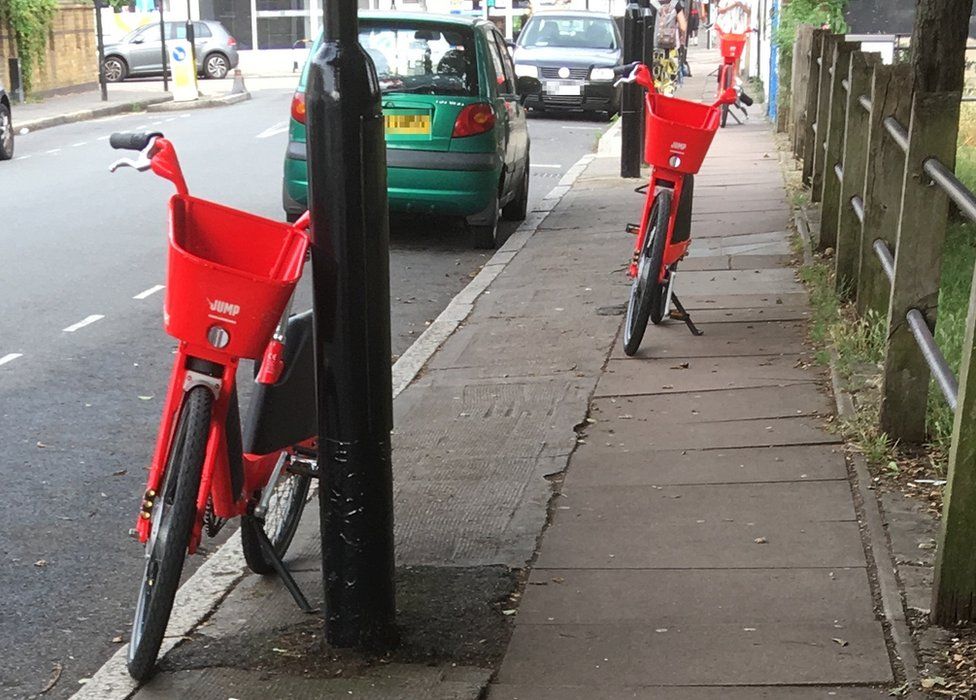'Dangerous' dockless bikes blocking streets, say disability activists
- Published

Registered as blind for 15 years, Deborah Persaud travels around London with guide dog Lewis by her side.
But on recent walks to work, the pair have faced a new challenge on pavements - dockless bikes for hire.
"Lewis has to navigate around them [and] we often end up having to walk onto the road," she said.
"I have bumped into them a few times and that's with Lewis. He is about to retire and I am absolutely terrified of using my white cane."
There has been a rise of tech start-ups offering app-based hire bikes around major cities, enabling customers to book and unlock bikes via an app - which uses GPS to find the nearest one available.
But unlike dock-based models, such as London's Santander Cycles, they can be then be left anywhere within designated parking areas.
Disability activists have said the schemes are causing "dangerous" obstructions for people with visual or mobility impairments in cities.
New to the sector are electric bikes. Lime's E bikes launched in London in December, while ride-hailing firm Uber placed its first fleet of red Jump bikes in Islington in May.
Both firms ask users to park bikes responsibly and out of the way of pedestrians.
'Hazardous'
But Ms Persaud, 50, from Islington, said pavements in her local area are "littered" with the vehicles.
The civil servant said they often added time to her journey as they blocked routes.
"There were three Jump bikes placed on the pavement in Dalston on 27 July, so we couldn't get on to it," she said.
"On Tuesday morning there were two Lime bikes parked on the pavement in Highbury, so we had to get someone to move them."
"It's frustrating," she added. "They are a hazard."
Dr Amit Patel, who lost his sight suddenly in 2012, said he had incidents where his cane had become trapped in the spokes of the bikes.
But the former University College Hospital doctor - who now relies on guide dog Kika to navigate London - said the worst situation he encountered was when bikes were parked against pedestrian crossings.
This blocks access to the tactile indicator on crossings, which tells visually impaired or blind people when they have right of way.
"It's inconvenient and it's dangerous," he said.
"If you are going to use the schemes, just bear in mind to leave bikes in a safe space."
Paralympian Baroness Tanni Grey-Thompson, who uses a wheelchair, said companies "have to be more responsible".
"The quality of the pavement is really important for disabled people," she said, adding that bikes parked on pavements had "huge potential to cause harm".
She said: "The companies have to send out a really strong message, but actually people just need to think more about others."
Issues have plagued dockless schemes in cities around the UK, with bikes left strewn across pavements, defaced or stolen.
Operators ofo, oBike and Urbo are all reported to have withdrawn from Britain since 2018.
Major operator Mobike last year withdrew from Manchester, Newcastle and Gateshead following vandalism and theft, and the company also shrank its operational area in London.
Transport for London and the capital's councils are now working to pass a new city-wide by-law to ensure schemes "are safely and responsibly managed", Michael Hurwitz, director of transport innovation at TfL, said.
The by-law is designed to work across borough boundaries and address problems such as pavements being blocked, according to London Councils.
Under current legislation operators do not require consent from the borough or TfL to operate.
But the manager of Disability Action in Islington, Andy Greene, said the bikes do not "dovetail with creating an environment which is inclusive" and wants the companies to go further.
Mr Greene, who uses a wheelchair, urged more schemes to roll out bikes that can be accessed by people with a range of impairments, such as hand bikes or three wheeled bikes.
"We seem to be back to 50 years ago when one size fits all," he said.
Nextbike, a dock-based cycle scheme, is due to roll out specially adapted bikes in Cardiff by this summer.
'Every effort'
A spokeswoman for Lime said the firm was "disappointed" to hear its bikes had been found obstructing pavements.
"Lime's network of e-bikes is maintained by a local operations team to ensure they are positioned considerately and, since our bikes require battery changes every few days, we are in very regular contact with our fleet," she said.
"Our team also works to ensure that improperly parked bikes flagged through our customer service channels are dealt with in an appropriate and timely manner."
A spokeswoman for Uber said customers should "take the time to park responsibly".
"Anyone found to be riding or parking bicycles irresponsibly may lose access to Jump," she added.
- Published30 April 2019
- Published11 May 2018